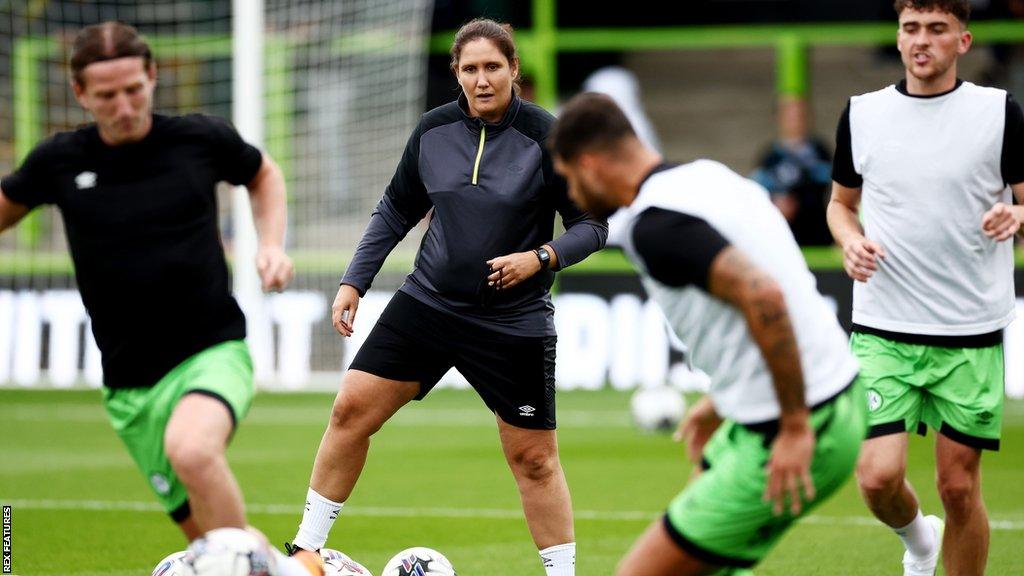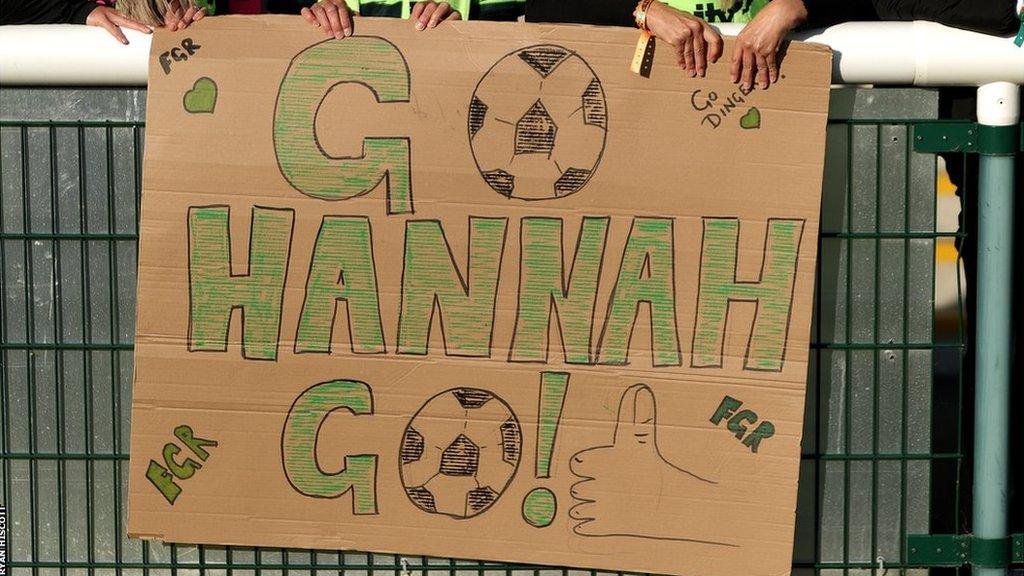Hannah Dingley: Forest Green Rovers head of academy on journey as female boss in men's game
- Published
Hannah Dingley: 'I had a security detail, it's something I've never had before'
Long before she made history and headlines by taking charge of an English Football League side, Hannah Dingley knew she wanted to be a football coach - even if she was not allowed to play the game herself at secondary school.
Dingley started coaching a men's team at the age of 17 in the small seaside village of Llansteffan near Carmarthen in south west Wales.
That - and a gritty work experience placement at Swansea City's old Vetch Field ground - inspired a coaching journey that led to her in July 2023 becoming the first woman to manage a professional men's team in England.
"It's been quite a journey from that little village in south Wales where I grew up to where I am now," says Dingley, 40.
The watershed moment came in the summer, when Dingley was appointed caretaker boss at League Two side Forest Green Rovers following the sacking of former Everton and Scotland striker Duncan Ferguson.
Cynics claimed it was just a public relations stunt by Dale Vince - the club's owner and green energy entrepreneur - to put Dingley in charge for a few weeks during pre-season.
But Dingley, who reverted to her usual job as Forest Green's head of academy when David Horseman was appointed manager, shudders at those suggestions.
"It was a little bit frustrating [to hear that]. My argument is how many academy managers or under-23 coaches take on interim roles at football clubs across the country?" she said.
"It happens regularly, and if they don't get the job they go back to their original role and carry on as normal.
"It's more insulting, I suppose, that there was an expectation I'd been given the job because I was female.
"I wouldn't want to be given a job purely because I'm female. I'd always want to be given a job on merit, because I deserve the position."
Media 'whirlwind'

Hannah Dingley puts the Forest Green Rovers players through their paces on the training ground
Dingley was not prepared for the huge media interest, as journalists and camera crews descended on otherwise low-key pre-season matches to capture history in the making.
"It was a bit of a whirlwind. The media attention wasn't something I was expecting or skilled at dealing with," she said.
"I even had security - something I've never had before. They were like, 'Let's get you in, keep your head down, don't speak to anybody.' All very different to what I'm used to doing.
"A good experience, though, because if that's something I'd like to do in the future then that [media attention] is something that comes with the role."
Born in St Albans, Dingley moved to Carmarthenshire when she was four as her parents wanted to be closer to where they grew up.
Life in Llansteffan would act as a launchpad for her coaching career, even though she had to overcome old-fashioned mentalities at her school.
"It was idyllic growing up there - tiny little village, seafront, beach on the doorstep, castle on the hill," she says.
"I was inspired to play football there, starting playing with the boys on the fields. I was usually the defender because they all wanted to be the strikers. But I was the one who went into football [as a profession] and my brother's a musician.
"We only had 30 children in the whole primary school. There weren't enough girls to have a girls' football team. And then it was a bit of a shock to the system going to secondary school because we were told girls don't play football - it's netball or hockey.
"But when I turned 16 I started playing for Carmarthen Town and got the bug from there. At 17 and 18 I started coaching the men's village team for a bit of experience.
"I also did work experience at Swansea City when they were still at the Vetch Field. Typical work experience things, spent a bit of time with the community trust, stuffing letters into envelopes, making teas and trying to carry them up and down the steps of the terraces without spilling them.
"They had a gym that was in the concourse and I remember watching some of the first-team players train there. Then you walk in on a matchday and your hair stands on end with all the noise on the terraces. That really helped inspire me to want to get into football."

A group of female Forest Green fans held up this placard before Hannah Dingley's first game in charge
Dingley took a football studies programme at Coleg Sir Gar in Llanelli before studying sport sciences at Loughborough University, where she honed her leadership skills.
She coached several men's non-league sides - including Gresley Rovers, Shepshed Dynamo and Leicester Nirvana - and had a spell as head of coaching at Burton Albion before settling in the Cotswolds at Forest Green.
Dingley skirts around the question of whether she was disappointed she didn't get the top job full-time at the New Lawn.
But it has whetted her appetite to do it again and she says it is only a matter of time before more female coaches get the chance to manage in the men's game.
"Yes, definitely. There are lots of very competent female coaches and managers who would be more than capable of taking on a men's team," she said.
"The point I'd make is we always want it to be a valid appointment. Not tokenism.
"Maybe there's this old-fashioned viewpoint about [what it might be like] going into a men's changing room.
"But players are professional athletes who will take on information and buy into things. I never had any issues with them.
"So I don't think there should be a barrier in terms of thinking how players would take it. They're paid to do a job and apply the game plan the coach gives them.
"I wanted to get that job because I deserved it. It was a great experience that put me in good stead for something that might happen in the future.
"At the minute I'm really happy with what I'm doing - it's a great club to work at and I've got a lot of support here.
"If an opportunity came up, you never know what might happen. But I'm not out searching for the next job."

DOUBLE TOP: The darts team on a mission to complete a decent season
A POSITIVE LIFE: HIV from Terrence Higgins to Today
